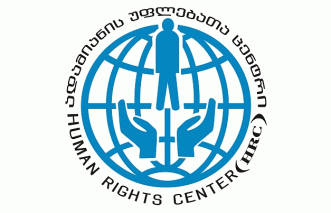The main trends identified by Human Rights Center in the second round of the Parliamentary Elections
November 22, 2020

Human Rights Center (HRC) observed the second round of the 2020 Parliamentary Elections in the polling stations of Khashuri-Kareli and Rustavi-Gardabani municipalities. The HRC monitors were observing the process of executing the election procedures from the opening of polling stations to the end of the polling, further they observed the counting process and the completion of summary protocols. The HRC observers also focused on the territory adjacent to the polling stations.
In the second round of the Parliamentary Elections in the Khashuri-Kareli constituency, Zaal Dugladze, the majoritarian MP candidate from the ruling party, Georgian Dream - Democratic Georgia, was opposed by Nato Chkheidze the majoritarian MP candidate from election bloc N 5, United National Movement - United Opposition.
In the second round of the Parliamentary Elections in Rustavi-Gardabani constituency, Nino Latsabidze, the majoritarian MP candidate from the ruling party, Georgian Dream - Democratic Georgia, was opposed by Davit Kirkitadze, the majoritarian MP candidate from electoral bloc N5, United National Movement - United Opposition.
Opposition parties boycotted the second round of the Parliamentary Elections most probably causing the low voter turnout in the constituencies. At the same time, the boycott affected the election results with Georgian Dream candidates winning in the both constituencies.
During the polling process, the precinct election commissions (PECs) had 6 members elected by the district election commissions, 3 members nominated by the ruling party, Georgian Dream and in some cases 1 member nominated by the opposition party, Alliance of Patriots. Two opposition parties that is United National Movement and European Georgia with a right assign members to the PECs, had no representatives to the PECs. The opposition parties themselves refused to allow their assigned members to the PECs to be involved in the process of the PECs operations for the second round. The representatives of the opposition political parties that have the right to observe the process were not sent to the PECs either.
A significant trend was the lack of observers from the qualified impartial and neutral NGOs at the polling stations. At the polling stations, there were many representatives of the organisations registered as observers unfamiliar to the general public. The actions and talks of the representatives of such organizations with other individuals revealed that they were supporters of the ruling party. The members of Georgian Dream employed in the PECs, the voters appearing to the polling stations and such observers seemed to be old acquaintances as observed by the HRC monitors.
Like in the first round of the elections, the problem persisted of the presence of unidentified individuals in the vicinity of polling stations who frequently spoke to the members of the PECs from the ruling party as well as to the representatives of the observer NGOs favoring the ruling party. The substance of such actions and of the conversations left the impression that they were acting in coordination and were observing how many individuals appeared to the elections in their support.
Due to the fact that the members of some of the opposition parties did not participate in the PECs, the commissions were composed of less than 12 members as required by the law, and in some cases there were only 9 or 10 members. Therefore, at some of the polling stations the number of registrars was less than the number envisaged by the law (at least 1 registrar for every 300 voters). However, the Election Code allows for a reduction in the number of registrars when the number of commission members is not sufficient to perform the key functions. Accordingly, the reduction in the number of registrars was carried out in compliance with the law. Given the low voter turnout, a fewer number of registrars did not cause a problem. However, in the midst of moderate or higher voter turnout, the number of registrars may not have been sufficient and may have caused overcrowding.
Some Ballot Papers from the Presidential Elections were found in 2020 Parliamentary Elections
Six ballot papers from 2018 presidential elections were found in the ballot box at polling station N8 in village Avlevi of Kareli Municipality, where a journalist accredited for the elections by online newspaper of Human Rights Center (HRC)www.humanrights.ge was observing the polling and counting process.
Each such ballot paper was placed in separate envelopes along with the majoritarian ballot papers for 2020 Parliamentary Elections. The relevant candidate was marked on the presidential election ballot papers bearing a signature and a stamp.
As the observers of HRC verified, the mentioned signature does not belong to any of the registrars of the precinct. Further, the seal number was not that of the precinct.
Following the request of the HRC observer, the PEC decided to send the ballot papers along other ballot papers to the Central Election Commission.
The commission does not declare void some of the ballot papers in favor of Georgian Dream
In Shida Kartli, after Tsaghvli polling station 16.35.37 was closed and the votes were being counted, the members of the election commission tried to add to Georgian Dream the ballot papers marking both candidates.
The observer of HRC complained about the issue and did not allow the ballot papers to be considered in favor of Georgian Dream. For this purpose the observer also took photos of the ballot papers, after which the members of the commission were induced to annul the ballot papers.
At the same time, some of the PEC members expressed aggression towards the observer referring s/he had no right to behave like that in their village accusing him/her of being a supporter of National Movement.
HRC was observing the second round of 2020 Parliamentary Elections in Kvemo Kartli and Shida Kartli regions with the support of Open Society Georgia Foundation.
News
December 13, 2023
Ethnic minorities outside the peace dialogue
November 6, 2023
‘Peace’ agenda of political parties
Popular
Articles
February 13, 2024



